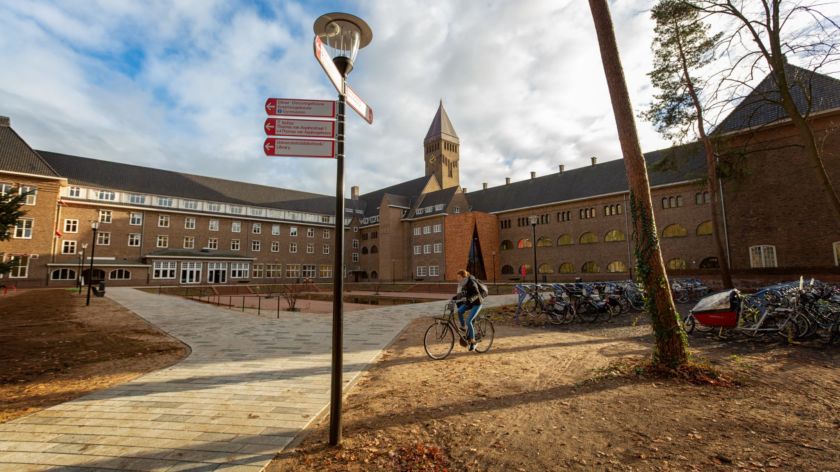Universities have little insight into side jobs of professors
-
 Berchmanianum. Foto: Dick van Aalst
Berchmanianum. Foto: Dick van Aalst
The mandatory registration of additional functions and interests of professors is incomplete and chaotic, says TV programme Nieuwsuur. Minister of Education Robbert Dijkgraaf finds it ‘disturbing’, and the universities promise to do better.
After two years of requests, the editorial staff of Nieuwsuur finally gained access to the side job registries of 14 universities and 7 university medical centres. It turned out that within those registries only 4.200 professors are registered, while the Netherlands currently has almost 7.000 professors.
Wrong data
Is it simply the case that the missing professors have no additional functions at all? Some of them do, according to a sample. The data that is present in the registries is often outdated, incomplete or wrong. The registration of additional functions and interests is mandatory to make sure the academic integrity remains intact.
Smaller institutes such as the Open University, University of Twente and University of Tilburg are better at registering the additional functions of professors than the larger universities. At the University of Groningen, more than half of the side job registry contains mistakes or is incomplete. A registry of the professors in the academic hospital of Groningen doesn’t even exist at all.
The University of Utrecht also has no registry. The university can only deliver information on the side jobs that professors publish on their own personal webpage.
Shocked
University association UNL, who assisted Nieuwsuur in collecting the registries, is shocked. ‘This is unacceptable. Something needs to be done about this,’ says chair Pieter Duisenberg. ‘Transparency is the cornerstone. So when you use your expertise, people need to be able to determine whether you work independently.’
The website of the association still shows that universities have become much better at logging data in the registries. At the start of 2021, over 95 percent of the additional functions of all professors should’ve been available online, compared to 87 percent in 2017.
Minister of Education Robbert Dijkgraaf finds the result of the research disturbing. ‘The scientific community cannot connect to society if she is not 100 percent transparent. I’m going to talk to the universities, because I’d like to hear what can be done about this.’
Former ministers
Even university board members and former minsters such as Jet Bussemaker and Jan Peter Balkenende do not have their data straightened out.. The same goes for minister Ronald Plasterk.
The latter is remarkable, as it was decided during his time as minister that the additional functions of professors should be public information. This was in 2008. At the time, the university association was against this decision, while the Royal Netherlands Academy of Arts and Sciences was in favor.
Since then, news has come out every now and then that the registries are not sorted out, with all the corresponding outrage. The HOP did research into the registries in 2009. The conclusion was that things were not looking good at all. In 2011, the cabinet at the time again said that the additional functions should become public information. The Groene Amsterdammer wrote about it in 2014.
In 2013, minister Jet Bussemaker refused to create a national registry and in 2015 she explained herself, stating that some things are private and therefore don’t need to be registered.
There have been multiple signs in the last few years that additional functions of professors lead to integrity breaches. Recently, the Volkskrant and Folia wrote articles about how professors of tax law and fiscal economics often wore two hats. Earlier research by Nieuwsuur into the ‘passport professor’ Dimitry Kochenov from Groningen resulted in this current investigation.
Radboud University
Nieuwsuur talks about one professor of Radboud University by name: Andreas Voss, professor in infection control and also head of infection control at the CWZ hospital in Nijmegen.
Nieuwsuur discovered that Voss has a board function at a private limited company that is not in the registry. The same goes for jobs at the Fieldlab Events and a supervisory role at the Gasthuis Millingen. In a written letter to Nieuwsuur, the professor says that he did not know about the regulations on additional functions and, furthermore, that he identifies more as a ‘CWZ person’, rather than an employee of Radboud, because he barely ever works there.
According to Voss, his private company VAID registers the income he receives from the Infection Prevention Guidelines Association, where he works as quartermaster, and from his supervisory roles. Until recently, he also had supervisory roles at Labmicta, the Regional Laboratory Foundation for Microbiology in Twente and the Achterhoek.
Voss states that he thought he had done everything by the book, as he had registered all of his additional functions at the Outbreak Management Team. His private company was not listed, as it concerns a ‘personal holding’, only meant to register his additional income. Besides, this private company will soon be dissolved, he let Nieuwsuur know.



